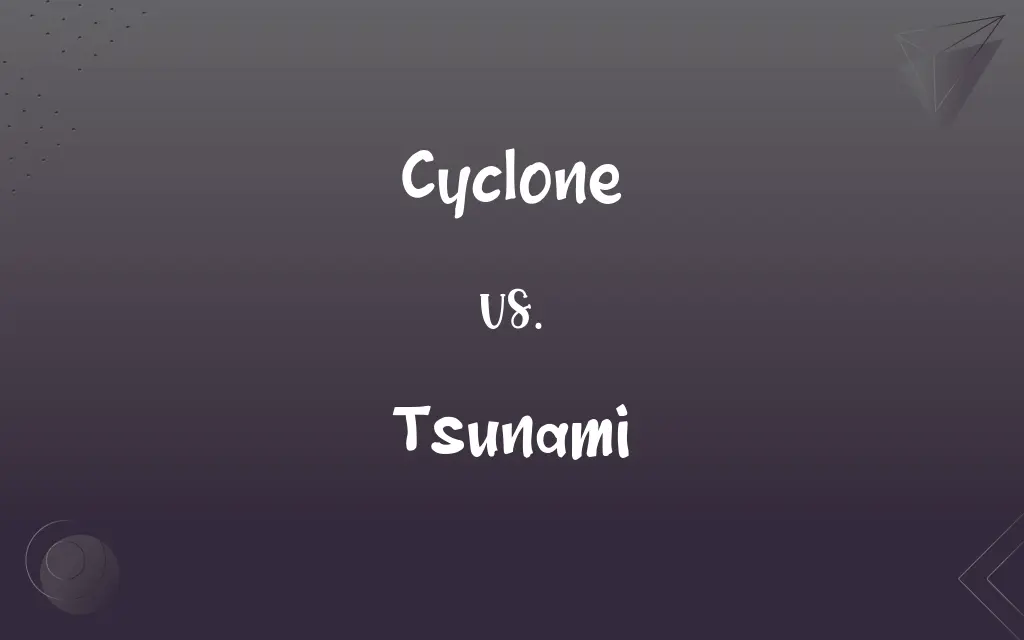Cyclone vs. Tsunami: What's the Difference?
Edited by Aimie Carlson || By Harlon Moss || Updated on October 18, 2023
A cyclone is a rotating storm system, while a tsunami is a large sea wave caused by underwater disturbances, often earthquakes.

Key Differences
A cyclone originates in the atmosphere as a large-scale wind system rotating around a center of low atmospheric pressure. Tsunamis, on the other hand, emerge from underwater disturbances, primarily from seismic activities like earthquakes beneath the ocean floor.
While cyclones manifest as intense rain and wind events, often leading to hurricanes or typhoons in certain regions, tsunamis are characterized by their massive waves that can inundate coastal areas.
The formation of a cyclone involves meteorological factors such as temperature, moisture, and wind patterns. In contrast, a tsunami's genesis often traces back to geological phenomena.
It's essential to understand that cyclones affect larger regions, sometimes entire coastlines or countries, with heavy rains and winds. In contrast, tsunamis can have a localized impact but with devastatingly high waves.
Early warning systems for cyclones often involve meteorological predictions days in advance, while tsunami warnings might only give hours or even minutes of notice due to their rapid onset after an underwater earthquake.
ADVERTISEMENT
Comparison Chart
Origin
Atmospheric
Underwater disturbances
Main Characteristic
Rotating wind system
Massive sea waves
Causes
Meteorological factors
Primarily earthquakes
Warning Time
Days in advance
Hours or minutes
Area of Impact
Larger regions
Coastal areas (can be localized)
ADVERTISEMENT
Cyclone and Tsunami Definitions
Cyclone
Often interchangeable with terms like hurricane or typhoon, depending on the region.
In the Pacific, a cyclone is often called a typhoon.
Tsunami
A large sea wave resulting from underwater disturbances.
The earthquake triggered a tsunami that hit the nearby coast.
Cyclone
A wind system that revolves around a center of low pressure.
The coastal towns were prepared for the cyclone's approach.
Tsunami
Characterized by its capability to inundate coastlines.
The tsunami's waves engulfed the entire coastal village.
Cyclone
Can lead to storm surges in coastal areas.
The cyclone resulted in a significant storm surge, flooding the beaches.
Tsunami
Rapid onset after triggering event.
Minutes after the earthquake, the tsunami reached the shorelines.
Cyclone
A meteorological phenomenon characterized by rotating winds.
The cyclone caused heavy rainfall across the region.
Tsunami
Can have multiple waves, with later waves being larger.
People were unaware that the second wave of the tsunami would be more destructive.
Cyclone
A system with inward spiraling winds.
The cyclone's intensity was increasing as it approached land.
Tsunami
Often caused by seismic activity beneath the ocean.
The undersea quake was the primary reason for the devastating tsunami.
Cyclone
An atmospheric system characterized by the rapid inward circulation of air masses about a low-pressure center, usually accompanied by stormy, often destructive weather. Cyclones circulate counterclockwise in the Northern Hemisphere and clockwise in the Southern Hemisphere.
Tsunami
A very large ocean wave caused by an underwater earthquake or volcanic eruption.
Cyclone
A violent tropical storm, especially one originating in the southwestern Pacific Ocean or Indian Ocean.
Tsunami
A very large and destructive wave, generally caused by a tremendous disturbance in the ocean, such as an undersea earthquake or volcanic eruption. Tsunami are usually a series of waves, or wave train.
Tsunami
(figurative) A large and generally unstoppable surge.
Tsunami
A huge destructive wave (especially one caused by an earthquake)
FAQs
What are the different types of cyclones?
The main types include tropical cyclones, extratropical cyclones, and mesocyclones.
Where do cyclones typically form?
Tropical cyclones typically form over warm ocean waters near the equator.
What is a cyclone?
A cyclone is a large-scale system of rotating winds around a central area of low atmospheric pressure.
How is a cyclone different from a tornado?
A cyclone is a broader weather system that can cover a large area, while a tornado is a small, violent vortex formed within thunderstorms.
What is the difference between a cyclone, hurricane, and typhoon?
hurricanes in the Atlantic, typhoons in the northwest Pacific, and cyclones in the south Pacific and Indian Ocean.
Can tsunamis be predicted?
While the exact occurrence can't be predicted, tsunami warning systems can detect them early to provide some warning.
Can human activities trigger cyclones or tsunamis?
Human activities can't directly trigger cyclones. However, events like underwater nuclear tests could potentially cause tsunamis.
Are there specific seasons for cyclones or tsunamis?
Cyclones have specific seasons depending on the region (e.g., Atlantic hurricane season). Tsunamis do not have a specific season as they depend on unpredictable geological events.
Can a cyclone cause a tsunami?
While both are related to the ocean, cyclones typically don't cause tsunamis. Tsunamis are usually caused by underwater disturbances like earthquakes.
How long does each event last?
A cyclone can last several days to weeks as it moves across regions. A tsunami comprises waves that may arrive minutes to hours apart, but the entire event usually lasts only a day.
Which regions are most vulnerable to cyclones and tsunamis?
Coastal areas, especially those in the tropics, are vulnerable to cyclones. Tsunamis mainly affect regions along tectonic plate boundaries.
How are cyclones and tsunamis studied?
Cyclones are studied using satellite imagery, weather stations, and aircraft reconnaissance. Tsunamis are studied through seismographs, ocean buoys, and historical data.
What is a tsunami?
A tsunami is a series of large ocean waves generated by sudden disturbances, typically underwater earthquakes or volcanic eruptions.
How does a tsunami differ from regular waves?
Tsunamis are caused by the displacement of a large volume of water, while regular waves are driven by the wind.
How fast can a tsunami travel?
In deep water, a tsunami can travel at speeds up to 500-800 km/h (310-500 mph).
Why do tsunamis cause so much destruction?
Due to their immense energy and volume, tsunamis can inundate coastlines, causing extensive property damage and loss of life.
Is there any connection between climate change and the frequency of cyclones and tsunamis?
Climate change may influence the intensity and frequency of cyclones. However, tsunamis are primarily geological in origin, so their frequency isn't directly affected by climate change.
Which has a more extensive area of impact: cyclones or tsunamis?
Cyclones generally affect a larger area as they involve a vast weather system, while tsunamis impact coastal regions directly in the path of the wave.
How can communities prepare for both cyclones and tsunamis?
Communities can develop early warning systems, establish evacuation plans, and build infrastructure that can withstand these natural events.
Which is more predictable: a cyclone or a tsunami?
Cyclones are generally more predictable due to their larger size and slower movement. Tsunamis, caused suddenly by disturbances, give limited time for warnings.
About Author
Written by
Harlon MossHarlon is a seasoned quality moderator and accomplished content writer for Difference Wiki. An alumnus of the prestigious University of California, he earned his degree in Computer Science. Leveraging his academic background, Harlon brings a meticulous and informed perspective to his work, ensuring content accuracy and excellence.
Edited by
Aimie CarlsonAimie Carlson, holding a master's degree in English literature, is a fervent English language enthusiast. She lends her writing talents to Difference Wiki, a prominent website that specializes in comparisons, offering readers insightful analyses that both captivate and inform.
































































